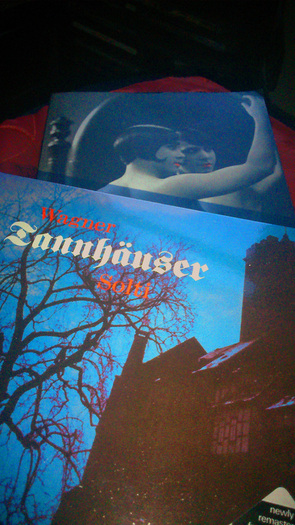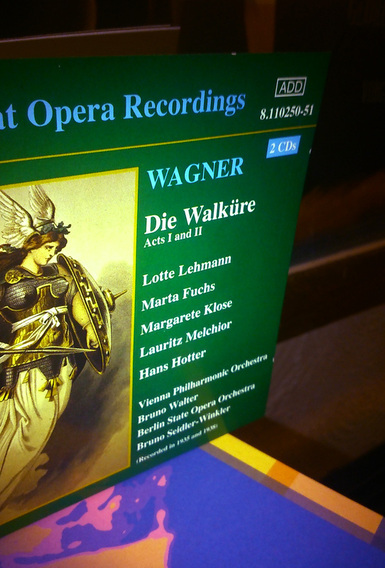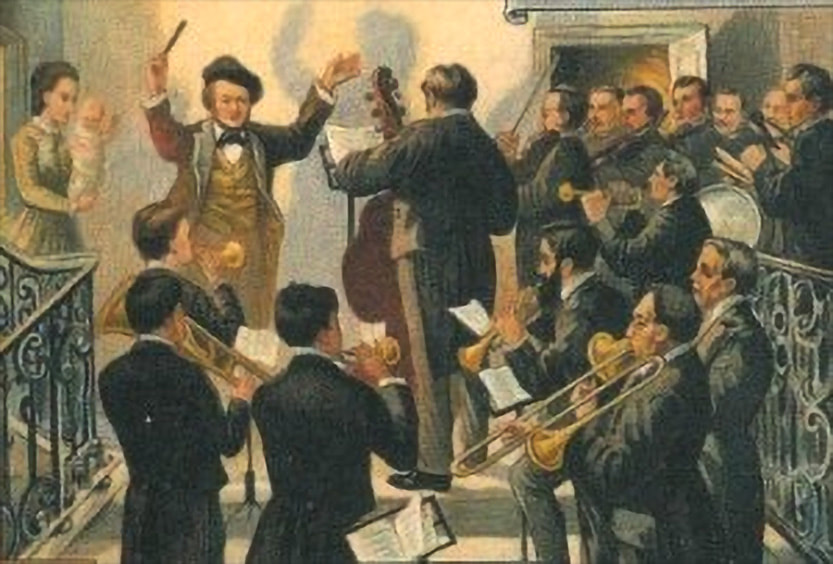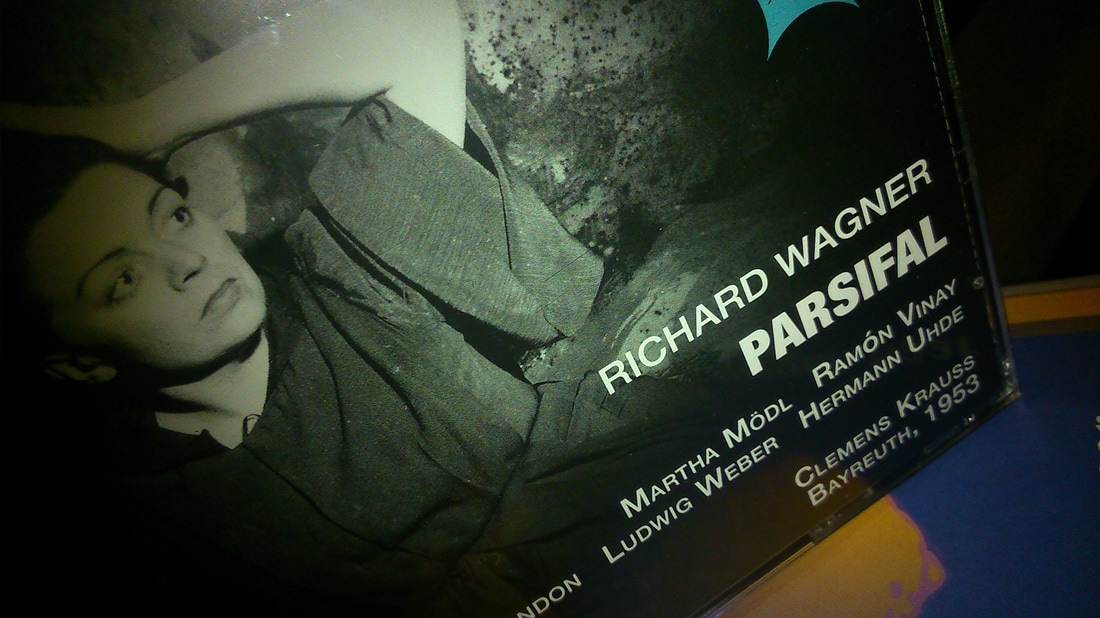|
Cosima's diary - Sunday, 25 December 1870 About this day, my children, I can tell you nothing-nothing about my feelings, nothing about my mood, nothing, nothing. I shall just tell you, drily and plainly, what happened. When I woke up I heard a sound, it grew ever louder, I could no longer imagine myself in a dream, music was sounding, and what music! After it had died away, R. came in to me with the five children and put into my hands the score of his Symphonic Birthday Greeting. I was in tears, but so, too, was the whole household; R. had set up his orchestra on the stairs and thus consecrated our Tribschen forever! The Tribschen Idyll—thus the work is called. — At midday Dr. Sulzer arrived, surely the most important of R.'s friends! After breakfast the orchestra again assembled, and now once again the Idyll was heard in the lower apartment, moving us all profoundly (Countess B. was also there, on my invitation); after it the Lohengrin wedding procession, Beethoven's Septet, and, to end with, once more the work of which I shall never hear enough! — Now at last I understood all R.'s working in secret, also dear Richter's trumpet (he blazed out the Siegfried theme splendidly and had learned the trumpet especially to do it), which had won him many admonishments from me. "Now let me die," I exclaimed to R. "It would be easier to die for me than to live for me," he replied. In the evening R. reads his Meistersinger to Dr. Sulzer, who did not know it; and I take as much delight in it as if it were something completely new. This makes R. say, "I wanted to read Sulzer Die Meistersinger, and it turned into a dialogue between us two." The Siegfried Idyll is a symphonic poem for chamber orchestra, composed by Richard Wagner as a birthday present to Cosima, after the birth of their son Siegfried in 1869. It was first performed on Christmas morning, 25 December 1870, by a small ensemble on the stairs of their villa at Tribschen. Wagner's opera Siegfried, which was premiered in 1876, incorporates music from the Idyll. It was once thought that the Idyll borrowed musical ideas intended for the opera, but it is now known that the opposite is the case: Wagner adapted melodic material from an unfinished chamber piece in the Idyll and later incorporated it into the love scene (Ewig war ich) between Siegfried and Brünnhilde in the opera.
1 Comment
Parsifal (Bayreuth ‘53) with Clemens Krauss at the helm. In the same year that this wonderful Parsifal was performed Krauss gave us an equally wonderful Ring des Nibelungen. A performance that became my favorite live Ring. Listening to Krauss in Wagner makes me wonder if there ever was a better conductor for this music. Parsifal was the only Wagner opera that was composed exclusively with the acoustics of the Festspielhaus in Bayreuth in mind. It was the first opera that was performed in Bayreuth after the second World War. From its premiere in 1882 to the first cycle of performances in Bayreuth after World War II (in 1951) the opera was considered a "life-changing" event for those who were lucky enough to see it (among them Gustav Mahler, who attended the opera in 1883). This "life-altering" experience took me quite some time to digest. The opera comes pretty close to an oratory and can be an exercise in slowing down (I do appreciate Knappertsbusch '51 now but Goodall got me lost between the notes). It was not until I heard the Boulez Parsifal from 1970 that the music started to make sense to me. Thanks to the relatively fast tempi from Pierre Boulez - that were on par with Clemens Krauss' and Richard Strauss' renditions of Parsifal in Bayreuth. Boulez himself noted that his tempi were not that much faster than the tempi Hermann Levi conducted during the premiere in 1882 (in 1966 Boulez used 61 minutes for the second act vs. Levi 62 minutes, 70 minutes vs. 75 for Levi in the 3rd act and 100 minutes vs. 107 in the first act). Parsifal is often considered a solemn mass for true believers with its broad tempi to emphasize the spiritual grandeur of the whole thing. But it was the Parsifal from Clemens Krauss that converted me. Lively and swinging are not the words that are used to characterize the piece Parsifal is but Krauss does a wonderful job to make a case for it. I have the Andromeda remastering from 2009 and although the mono sound might not be for hifi-buffs the quality is more than acceptable for me. I noticed that after my visit to Bayreuth, having heard the famous acoustics first hand, I started to extrapolate the 50's Bayreuth sound into an impressive theater experience at home.  Tannhäuser is Wagner's fifth opera. The story goes that famous tenor Jon Vickers - who sang many Wagner roles - refused to play this one because he found the character Tannhäuser despicable (it was due to his Christian believes that he thought so). Tannhäuser is seduced by Venus and lives in the mountain, that bears her name, a life of sin. In an attempt to bring opera to the people as a home theatre experience producer John Culshaw seasoned the Wagner recordings he made for Decca with all kinds of sounds that made the recordings in question by times sound like a radio play. In this Tannhäuser with Georg Solti at the helm that is no different. Solti’s conducting of Wagner troubles me. His status as a Wagner conductor is undisputed but it just doesn’t seem to work for me. With Decca he worked himself through the Wagner catalogue but the results never reach the echelon of benchmark recordings. To put it short: his conducting falls short in story telling. Solti is a man of large gestures and of the bombast Wagner so often is associated with. And perhaps that’s why I don’t like him. I don’t listen to Wagner because of the supposed loudness and sonic mayhem (I put on a Napalm Death record if I want that) but for the musical subtlety and the sheer quality of the notes that both are unequalled in the world of music drama. As a conductor Solti fails to show the listener the layers in Wagner’s musical world. It fails to transcends that world into a world of the mind in which no boundaries exist and in which the listener is more than happy to get lost. Instead it reduces a place of three dimensions into flatland. It’s Wagner for the fitness room but I put on some midtempo metal if I am looking for a soundtrack for the gym thank you. As a recording this Tannhäuser is like a movie that got his head stuck in the special effects department without having a clue about the lyricism that makes a story tick. And that’s all a big pity because, as always for Decca, the singers for Solti are top notch (although Rene Kollo might be an acquired taste for many). Especially Christa Ludwig as Venus is superb. She knows how to seduce a man but like Tannhäuser himself, who doesn’t want to be in the mountain of Venus any longer, this listener takes a run from it.  There are frustating aspects in the search for recordings of Wagner operas. Dealing with as many aspects as there are in a music drama, and especially the Ring operas, there is always something left to desire. There is almost always a wish to have things different than they are on record. Another singer for a certain role, another choice of tempi in certain passages, better sound quality. How much as I love good hifi-sound some of my favorite recordings are historical ones. Die Walküre conducted by Bruno Walter is one of them. A studio recording from 1935 that has this rare quality that it is near perfect. Even the sound, 30s mono, is more than acceptable. No distraction from tape hiss or other collateral sound deficits in the remastering for CD. The one mayor set back here is the fact that only the first act was completed in the 1935-sessions. The place initially meant for the recording sessions, Berlin, was abandonned because of the direct consequence of the rise of the Nazis. For Jewish artists it was no longer possible to work in Germany. Bruno Walter, Lauritz Melchior (Siegmund) and Lotte Lehmann (Sieglinde) moved to Vienna where they recorded the first act and parts of the second act. The rest of the second act was recorded in 1938 with another conductor, Bruno Seidler-Winkler, who took over from Bruno Walter who already had fled to America. In 1945, the third act was recorded with Artur Rodzinski at the helm, making this a kind of patchwork Walküre. But it is the first act under Walter that scores 5 out of 5 stars. Walter, a personal friend from Gustav Mahler, has a natural understanding with the score that makes you keep coming back for repetitive listening and Melchior and Lehmann are perhaps the best Walsungen twin I have heard so far. Especially Lotte Lehmann is wonderful. Her voice is full of compassion, she gives her brother on the run the comfort he is looking for and give consolation to the listener that there are opera recordings that, in fact, offer salvation. |
Archives
September 2023
Name/dropping
All
|



 RSS Feed
RSS Feed